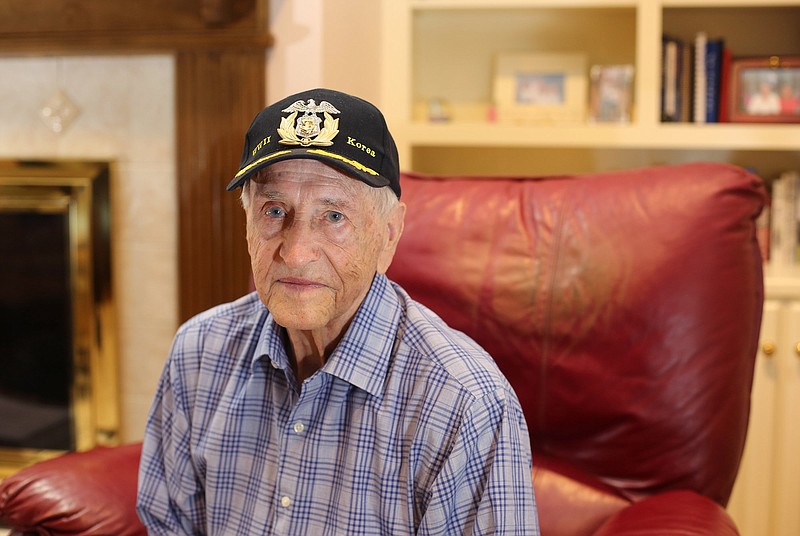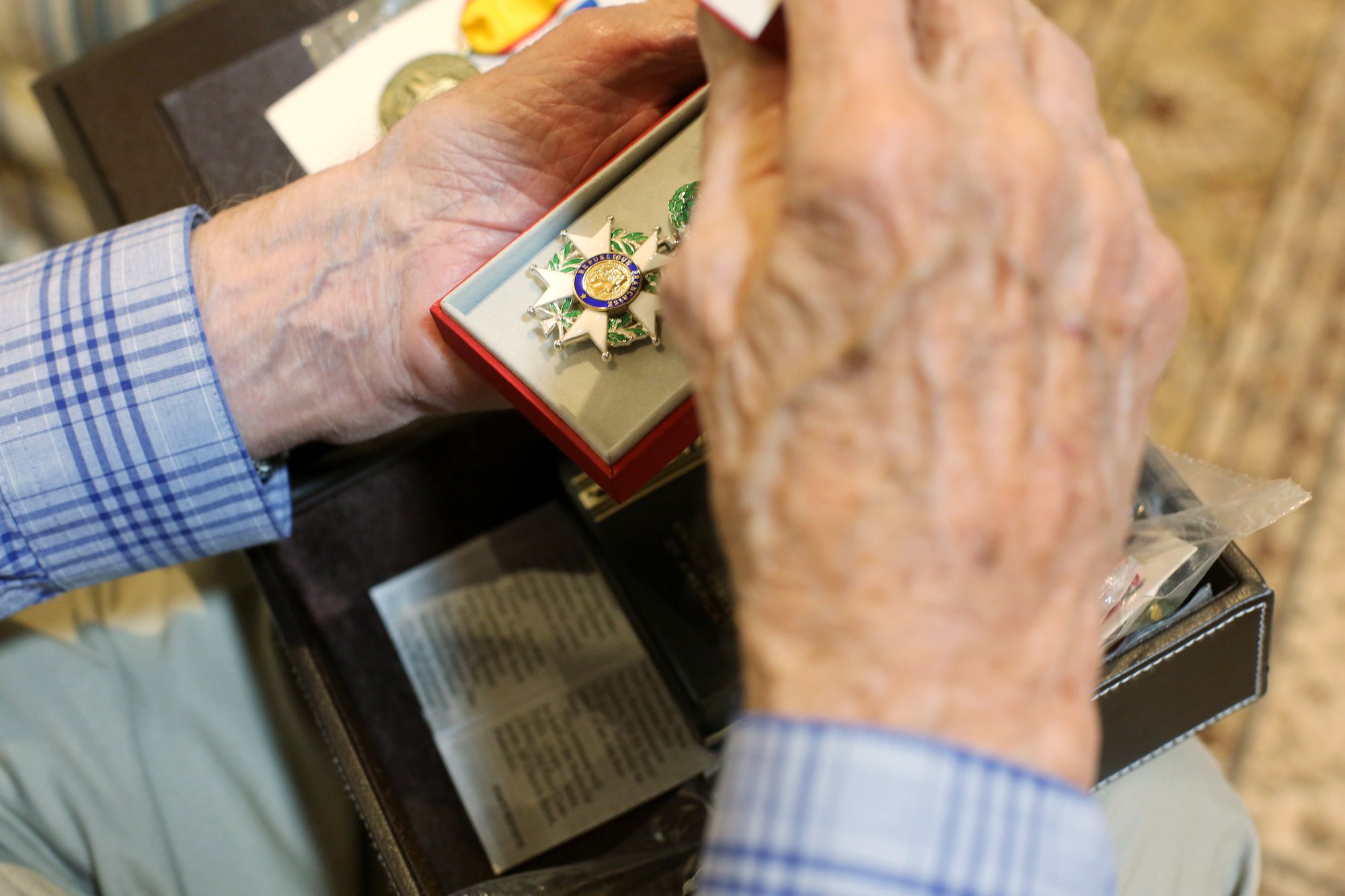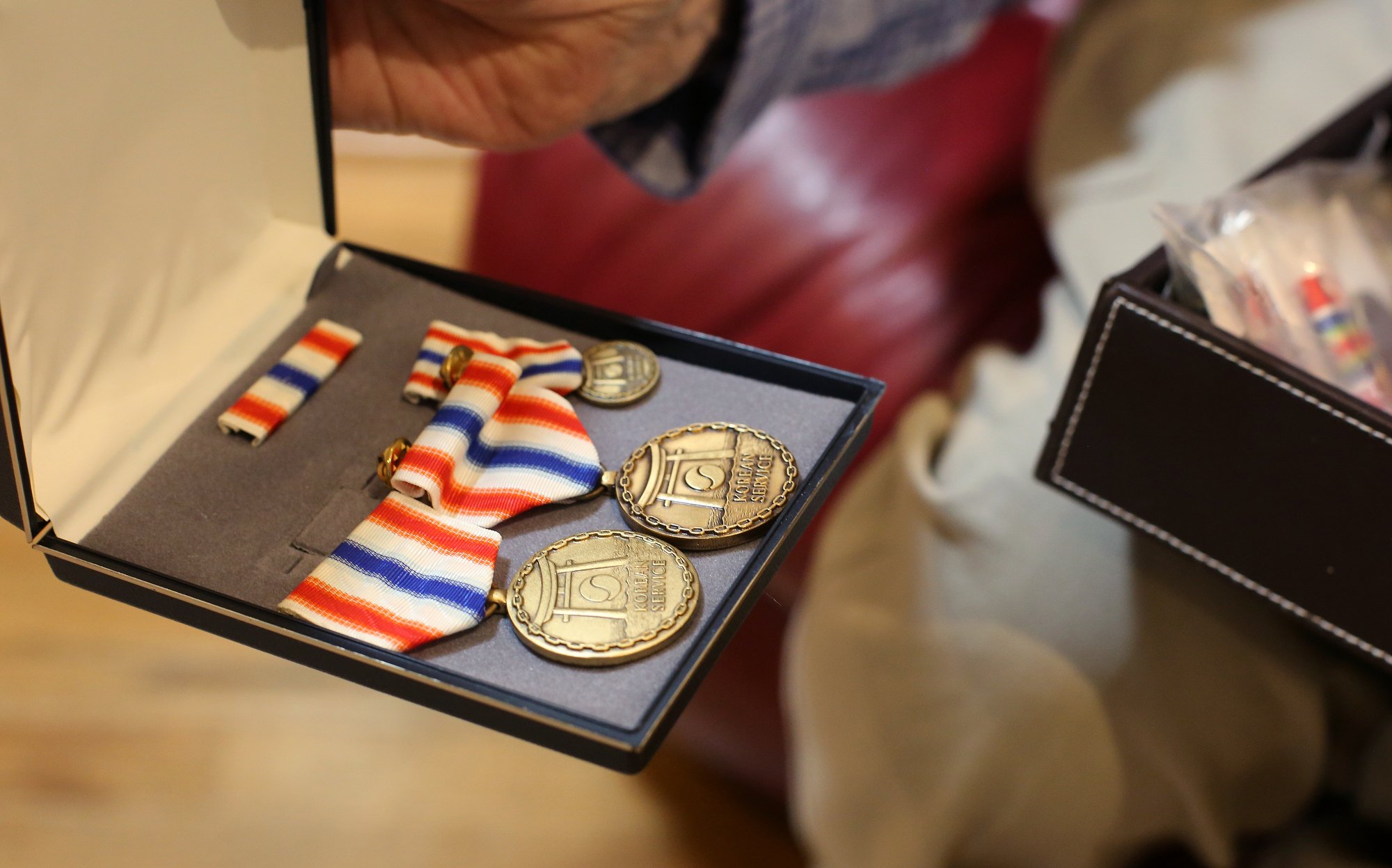World War II was raging and Vince Patterson wanted to join the Navy. But at age 16, he couldn't without his parents' permission.
Then he learned the United States Merchant Marine - an auxiliary arm of the Navy - was so desperate for manpower they'd take anyone age 16-80 who could help transport war supplies on cargo ships across the globe. Plus, he could tell his parents it was less dangerous.
"We've got thousands and thousands of miles of ocean to get our troops, our tanks, our ammunition, oil, gasoline, food supplies - everything you need for war - across. This is where the Merchant Marine came in. We were the logistics of World War II," Patterson said. "We supplied 270 million tons of supplies over the war years. That adds up to 4,000 tons, every hour, every day throughout the war, 24-7."
Patterson quickly learned his role in the war was just as perilous, if not more, than many others serving their country.
The U.S. Merchant Marine had one of the highest casualty rates of World War II, with more than 9,000 deaths out of about 250,000 service members, according to Patterson. Another 11,000 mariners were wounded and more than 700 taken as prisoners of war, he said.
Merchant mariners were already helping bring needed supplies to U.S. allies before Japan attacked Pearl Harbor and the U.S. entered the war in December 1941. Because the U.S. was neutral at the time, their ships were supposed to be safe from enemy attack, but their effort frustrated the Axis powers enough to still attack the cargo ships from time to time. When the U.S. finally entered the war, German submarines called U-boats swarmed the East Coast with a vengeance, Patterson said.
(Read about other local veterans in our "21-Veteran Salute" series here)
BIO
Name: Vince PattersonAge: 93Branch of military: U.S. Merchant MarineYears of service: 1942-1951
While most mariners underwent military training, there was no time for that when Patterson signed up in June 1942. He was thrust on a ship and into the fire. The "liberty ships" they used to transport cargo were "sitting ducks" for U-boats, he said.
"We were not really prepared for what we got into. I mean, we were fighting on both sides of the globe, thousands of miles from our home shores," Patterson said. "[Liberty ships] would do 10 knots, which was 12 miles an hour. The submarines that were after us, they could do 10 knots underwater, and they could do 18 on top of water."
The Navy commander at the time looked down at the Merchant Marine and failed to give their ships basic protections. He refused to offer them convoys or call for nighttime blackouts on land, so ships were backlit as they left port, making them easy for U-boats to spot. Some ships didn't have guns to defend themselves, so the only option was for mariners to paint large poles gray and pray the illusion that they were armed would afford some protection, Patterson said.
On his first voyage, a submarine was already stalking their ship as it sailed into Patterson's hometown of New Orleans to pick up cargo. From there, they sailed to Trinidad in the Carribean, a common launching point, and prepared to sail across the South Atlantic to Cape Town, South Africa. At the time, Germany controlled the North Atlantic, so the only way to get supplies into Italy was to circumvent Africa, sail through the Indian Ocean and into the Mediterranean Sea from the east.
As they left, a sister ship carrying many of Patterson's friends followed close behind, but a submarine put a torpedo in her right outside of Trinidad.
"She sank in two minutes. The captain, 30 crew members and eight Navy armed guards all went down with the ship," he said, adding that the Navy guards traveled on board to man the ship's guns.
Once near Cape Town they encountered German raiders, who had faster ships, with large guns, torpedo tubes and accompanying aircraft used to hunt for enemy ships.
"We made the trip twice, and I don't even know how we got by them. They would sink the ships, take the crews, put them on the ship, and when they got full they would turn them over to the Japanese," he said, adding that the Japanese were known for being especially cruel to prisoners.
One of Patterson's more notable cargoes was a few hundred Tuskegee Airmen. They sailed from Virginia to Italy with a large convoy of destroyers and an aircraft carrier. After dropping the troops off in Taranto - "in the boot of Italy" - they were ordered to sail to Bari on the east coast of Italy, where they encountered a grim scene of sunken, rusting ships and decimated docks. Patterson said he later learned the German air force had flown over the harbor a few weeks earlier, bombing 17 ships and killing more than 1,000.
"It was the Pearl Harbor of Italy," he said.
Merchant mariners' role in World War II was largely unknown and remains so today despite their crucial role and the peril they faced.
During the war, they received no government benefits and only earned money when their ships were at sea. Their pay stopped if their ship was sunk, and more than 1,550 were. When the war ended, members of the Merchant Marine were cast aside as civilians and left out of the G.I. Bill that was awarded to other military personnel. Patterson and other U.S. mariners from World War II were finally deemed veterans 43 years later.
"We missed out on free education, house loans, job security and everything," Patterson said. "Now I have medical privileges at the VA, and I can be buried in the cemetery. That's about it."
Patterson continued to serve in the Korean War, for a total of nine years of service, before leaving the Merchant Marine in July 1951 to focus on his wife, children and a new career at home. He retired from sales in 1991 and moved to Signal Mountain, Tennessee, 15 years ago to be closer to his grandchildren.
Although he holds a slight grudge for how the Merchant Marine was treated, he doesn't regret his service and said he loved being a sailor and the freedom that came with it. He's documented many of his journeys and contributed his writings to Florida State University's Institute on World War II and the Human Experience.
"In my nine years of sailing the oceans of the world, I have tasted the salt of the sea on my tongue, slept on hatch covers and saw millions of stars in the heavens," one of Patterson's entries reads. "Some people are born and live their whole life within a few miles of their birthplace. They never experience the wonders of what the world holds for them."
Contact Elizabeth Fite at efite@timesfreepress.com or 423-757-6673.


